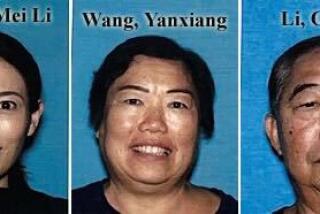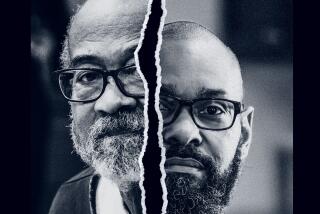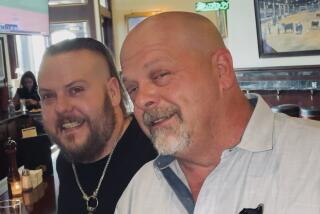Henry Hill dies at 69; mob informant was subject of ‘GoodFellas’
Henry Hill, the infamous mob informant whose life of crime was chronicled in the film classic “GoodFellas,” was the first to admit that he did “a lot of bad things back then.”
“I shot at people. I busted a lot of heads, and I buried a lot of bodies,” he told the London-based Daily Telegraph in 2010. “You can try to justify it by saying they deserved it, that they had it coming, but some just got whacked for absolutely no reason at all.”
Hill, 69, who was in the federal witness protection program in the 1980s and later made various attempts to cash in on his notoriety as an ex-mobster, died Tuesday at West Hills Hospital in West Hills, said Nate Caserta, the son of Hill’s girlfriend, Lisa Caserta.
Hill, who had open-heart surgery last year, died of complications of heart problems related to smoking, Nate Caserta said.
Hill was a onetime member of the Lucchese crime family in New York. His criminal endeavors included participating in the 1978 heist of $5.8 million from the Lufthansa air cargo terminal at John F. Kennedy International Airport — the largest single cash robbery in U.S. history — and helping fix Boston College basketball games in the 1978-79 season.
In 1980, after narcotics agents busted the cocaine operation Hill was running, he chose to become a prosecution witness against his former mob associates and entered the witness protection program.
At the time, Hill also feared for his life: Jimmy “The Gent” Burke, the reputed mastermind of the Lufthansa heist, reportedly began killing those who had been involved in the robbery to keep them from sharing the profits.
“I knew I was going to get whacked and it came pretty close,” Hill told the Telegraph in 2010. “So it was either me or them. I knew it, and they knew it.
“Initially, I had a lot of remorse and it took me a long time to forgive myself for what I did, for being a rat. But I knew I saved a lot of lives by putting a lot of horrible people away. You live by the sword, you die by the sword.”
Hill’s testimony on the 1978 heist, murders and other crimes led to about 50 convictions, including those of Burke and Paul Vario, a Lucchese crime family captain. (Both died in prison.)
After entering the witness protection program, Hill, his wife Karen and their two children were relocated to Omaha. It was the first of numerous moves to different locations across the country, where Hill lived under a variety of assumed names. Hill and his wife were later divorced.
While still in the witness protection program, he was convicted of burglary, assault and three DWIs, according to a 2001 Associated Press story, which said he was tossed from the program in 1987.
Hill’s criminal career in the mob — it included extortion, truck hijackings, auto theft, illegal gambling, armed robbery and time in prison — was chronicled in journalist Nicholas Pileggi’s bestselling 1987 biography “Wiseguy: Life in a Mafia Family.”
The former mobster’s celebrity profile received an even bigger boost with the release of director Martin Scorsese’s 1990 movie “GoodFellas,” which was based on Pileggi’s book and starred Ray Liotta as Hill.
The movie, which also starred Robert De Niro and Joe Pesci, “was 99.9 percent dead-on,” Hill told the St. Petersburg Times in 2011.
And, as the movie portrayed, he said he never whacked anybody. “I was the money man,” said Hill, whose criminal past included the 1967 robbery of $420,000 from the Air France cargo terminal at the Kennedy Airport.
Over the years, Hill was in demand as a lecturer and as a commentator on television shows and documentaries examining organized crime — as well as making phone-in appearances on Howard Stern’s radio program.
In 2001, he launched his own website, https://www.GoodFellaHenry.com.
“You want to enter my site?” visitors were asked. “Then leave your piece at the door.”
The site included autographed memorabilia, including a signed “GoodFellas” poster and autographed copies of “Wiseguy.”
It even offered a tongue-in-cheek, David Letterman-style Top 10 list of mob hits, including No. 3: YANKEE CLIPPER: “Baseball-batting the person to death, while taunting.”
Hill also made a few forays into book publishing: “The Wiseguy Cookbook,” a mix of recipes and personal history, was published in 2002. “A Goodfella’s Guide to New York” followed in 2003 and “Gangsters and Goodfellas: The Mob, Witness Protection, and Life on the Run,” written with Gus Russo, was published in 2004.
Hill had a number of run-ins with the law in his later years, including a charge of disturbing the peace in 2003 and charges of possession of cocaine and methamphetamine in 2005.
Despite attending substance-abuse classes, he continued to struggle with alcohol.
“I’ve been on every drug humanly possible, and I can’t get a handle on alcohol,” he told the Associated Press in 2009 after an arrest for a drunken disturbance in St. Louis.
The son of an Irish American electrician father and an Italian American mother, Hill was born in Brooklyn on June 11, 1943. As a boy, he grew to admire the local mobsters.
“I was intoxicated by their lifestyle when I was young,” he told the British newspaper the Sun in 2010. “Those guys were the role models of my neighborhood; they were the guys with the Cadillacs and diamond rings and a girl on each arm.”
The mobsters took him under their wing, he said. “I’m dyslexic and wasn’t good at school and they were the only guys patting me on the back.”
He began working as an errand boy for Vario’s men in 1955. But as a young man, he said in the Sun interview, he went on to do a lot of “nasty” stuff.
“I never killed anyone personally, but I buried a lot of bodies,” he said. “They would whack somebody and I had to go and dig the hole. I witnessed a lot of executions, maybe 10. I’ve seen guys killed for nothing. I had many sleepless nights and I still do today.”
In the 2011 interview with the St. Petersburg Times, Hill said he was living a quiet life in Topanga Canyon, with Caserta.
“I feel safe now,” he said.
A complete list of surviving family members was not available.
More to Read
Start your day right
Sign up for Essential California for the L.A. Times biggest news, features and recommendations in your inbox six days a week.
You may occasionally receive promotional content from the Los Angeles Times.



















































